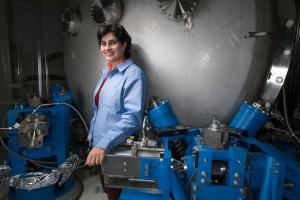Year born: 1968
Research Areas: Astrophysics, Experimental Physics, Quantum Mechanics
"Anybody should be able to do those things. And I am proof of that because I am all of those things. With the right combination of opportunity, it was possible for me to do."
Source: Science.org 2012

Early Life
Nergis was born in Lahore and grew up in Karachi, Pakistan. She spent her childhood in a home without gender stereotypes. This meant she and her older sister were free to follow their own interests. Nergis developed hands-on and practical skills, including fixing her bike, and enjoyed science and maths. She thought she would become an engineer when she was older.
In 1986, Nergis moved to the United States to study physics and astronomy. During this time she discovered her love for physics and research. In 1990 she received her bachelor's degree in physics and astronomy from Wellesley College. She then became a graduate astrophysics student at Massachusetts Institute of Technology (MIT). In the USA, graduate students must pass an exam to show they have the skills needed to complete a PhD. Nergis failed this exam twice but carried on working to improve herself till she passed. Nergis received her PhD from MIT in 1997 and continued her research at the California Institute of Technology.
Career Highlights
In 2002, Nergis returned to MIT and became a professor of astrophysics. She is now the Dean for MIT's School of Science. In this role, Nergis is responsible for managing all the departments that are part of the School of Science.
Nergis has worked on quantum science and the development of techniques which use lasers. But most of her research has been spent trying to detect gravitational waves. Gravitational waves are ripples in the fabric of space-time. They are caused by massive amounts of energy released when massive objects interact with each other. It is very hard to detect them because they only stretch space by a tiny amount. During her PhD, Nergis developed a prototype for an instrument that could detect gravitational waves. She is now a world leader on this topic of research.
In 2016, Nergis was part of the team of scientists who made the first direct detection of gravitational waves. They used the Laser Interferometer Gravitational-Wave Observatory (LIGO) to detect ripples produced by two black holes colliding. This discovery confirmed one of the main predictions made by Albert Einstein in his 1915 general theory of relativity. In 2017, the Nobel Prize committee awarded the prize in physics to Nergis’ doctoral advisor, Rainer Weiss, an emeritus professor of physics at MIT, and to their colleagues Barry Barish and Kip Thorne for their "decisive contributions to the LIGO detector and the observation of gravitational waves."
Legacy
Nergis is an openly queer Pakistani woman. She is also a mother of two children. In 2014, she was named LGBTQ Scientist of the Year by the National Organization of Gay and Lesbian Scientists and Technical Professionals. Nergis often speaks about her experiences and the challenges she has overcome. She is a dedicated mentor and role model for the LGBTQ+ community.
Nergis has received many awards for her work in science including a MacArthur fellowship. She is a fellow of the American Physical Society and an elected member of the National Academy of Sciences.
Other Interests
Nergis enjoys sports and was on the Wellesley squash team. She is also still a keen cyclist. Nergis thinks her experience of competitive sport has helped her to succeed in her career.
